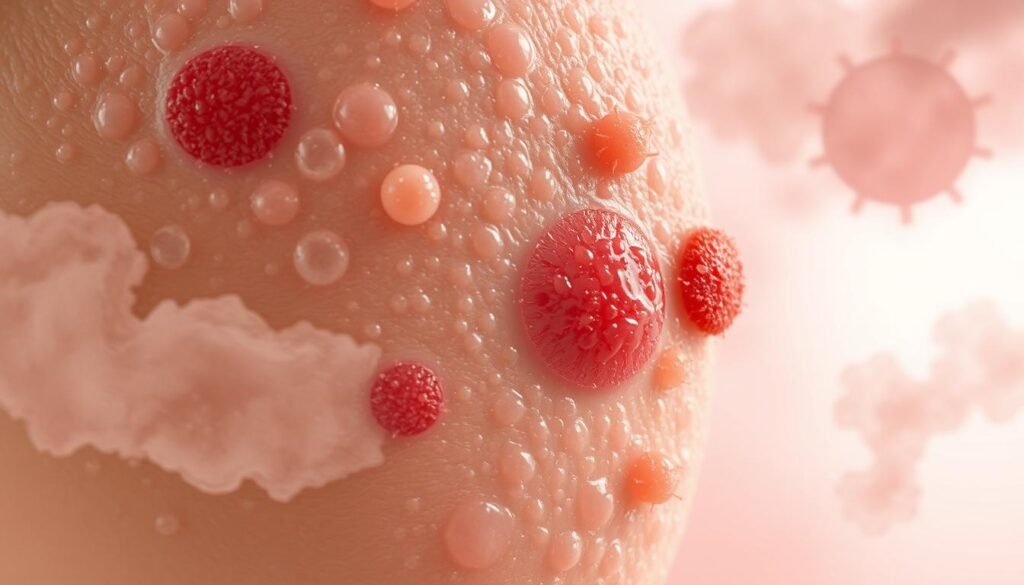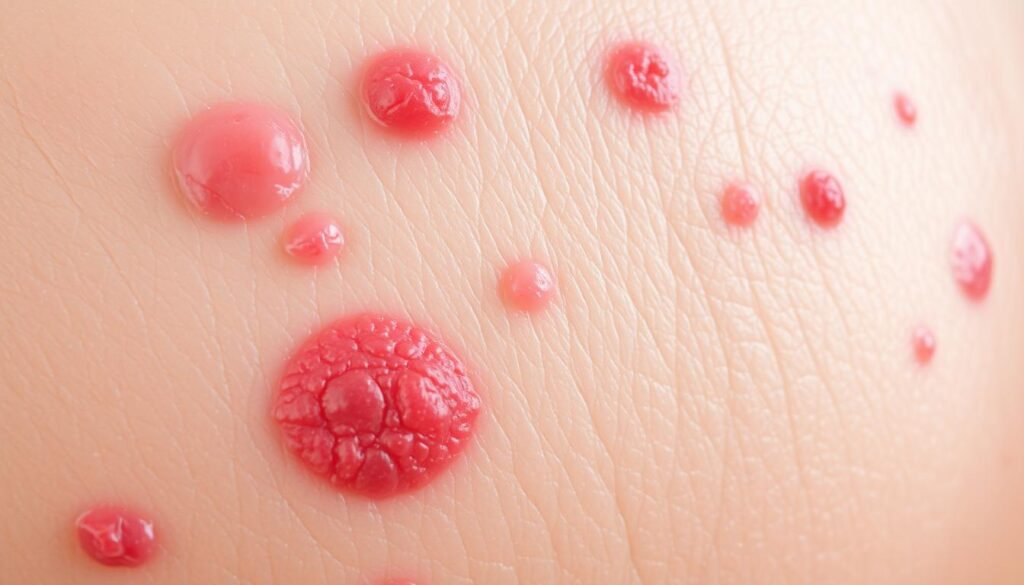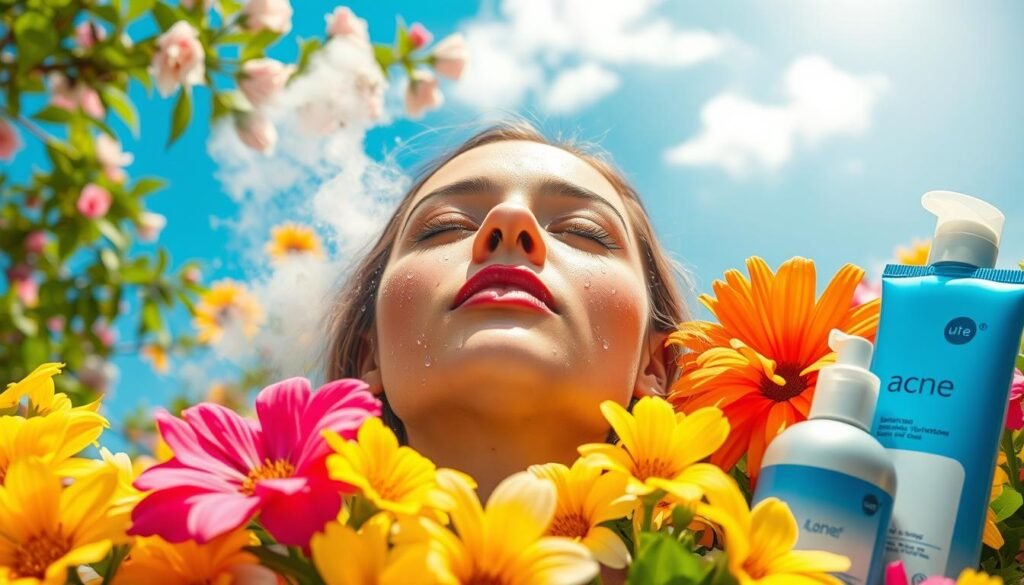Did you know nearly 50 million Americans get acne every year? It gets worse in humid weather. Humid air makes you uncomfortable and makes your skin oily. This can cause breakouts. If you have oily skin, humidity might make your acne worse during hot months. Sweat and oil mix with dirt, making it hard to keep skin clear.
We’re going to look at how humidity and acne are connected. We’ll see how wet weather can make skin problems worse. Knowing about humidity’s effects is key. With this knowledge, you can find the best way to take care of your skin.
Key Takeaways
- Humidity often increases oil production, leading to more frequent skin breakouts.
- Warmer months can exacerbate common acne triggers, such as sweat and dirt exposure.
- Gentle, high-quality skincare products for oily skin can help manage acne.
- Regular exfoliation aids in removing dead skin cells that contribute to acne.
- Consulting with dermatologists can provide effective treatment options for severe acne issues.
- Choosing mineral-based sunscreens protects the skin while preventing acne flare-ups.
The Relationship Between Humidity and Acne
Humidity has a strong link to acne development, especially in warm months. When it gets hotter, our skin’s oil glands work harder. This causes more oil, which can clog pores and make skin look shiny. Such conditions lead to annoying acne like blackheads and whiteheads.
To combat humidity’s effects on skin, washing the face twice a day is key. A gentle face wash with 2% salicylic acid can remove sweat, oil, and dirt. This helps prevent pores from getting clogged. Adding a daily exfoliator with 11% afaLUXE™ helps by removing dead skin cells that cause acne.
It’s a mistake to not use moisturizer when humidity is high. People think it will stop breakouts. But not moisturizing can dry out the skin. When the skin is dry, it makes more oil. Using a light moisturizer that doesn’t clog pores is very important.
Bacne, or back acne, gets worse with heat and humidity too. Sweating and clothes rubbing against the skin can cause this. For bacne, try CLn SportWash and wear clothes that keep sweat away. Also, change out of wet swimsuits to avoid breakouts.
Changing your skincare with the seasons helps keep your skin healthy. Spend less time outside and change damp clothes quickly. Wash your bed things and drink lots of water. These steps can reduce acne in the summer.
| Humidity Effects on Skin Health | Recommended Actions |
|---|---|
| Increased oil production | Cleansing twice daily with salicylic acid |
| Clogged pores leading to breakouts | Daily exfoliation with afaLUXE™ |
| Dehydrated skin causing overproduction of oil | Use a light moisturizer |
| Bacne prevalence due to sweating | Use moisture-wicking fabrics and CLn SportWash |
Understanding Acne Causes
Acne is a skin problem many people face, especially from 11 to 30 years old. The main causes are too much oil and dead skin cells. These elements can cause breakouts that are hard to get rid of.
How Excess Oil Leads to Breakouts
When there’s too much oil, breakouts are more likely. Puberty makes our skin oilier. This happens because our hormones change.
This oil can mix with dead skin on the surface, blocking pores. Blocked pores let bacteria grow, making acne worse.
Role of Dead Skin Cells in Acne Development
Dead skin cells also lead to acne. If our skin doesn’t get rid of these cells well, they pile up. They block pores when mixed with oil.
This mix is perfect for bacteria to grow, causing redness and pimples. Managing oil and dead skin cells is key to fighting Acne Causes.

The Impact of Humidity on Sebum Production
Understanding how humidity affects sebum production is key to skin health. This is especially true for those prone to acne. High humidity makes sebaceous glands work harder. This can lead to too much oil on the skin.
This extra oil increases the chance of breakouts. This happens more when the skin also sweats.
How Humidity Triggers Oil Production
In humid places, our bodies make more oil. The skin does this to keep its moisture balanced. But, too much oil can clog hair follicles and trap bacteria, causing acne.
This problem is worse in areas like Singapore. There, the high humidity is always an issue.
Effects of Increased Sweat on the Skin
Sweating more adds to the problems caused by humidity. Sweat and oil together are a breeding ground for bacteria. This can lead to different skin issues and make acne worse.
Bacteria, sweat, and oil create a cycle. This cycle can increase inflammation and blemishes. It’s vital to manage both moisture and oil to prevent these problems.
| Condition | Humidity Level | Effects on Sebum Production | Possible Acne Outcomes |
|---|---|---|---|
| High | Above 70% | Increased sebum production | Clogged pores, breakouts |
| Moderate | 50-70% | Normal to slightly elevated sebum | Occasional acne issues |
| Low | Below 50% | Decreased sebum | Dry skin, irritation |
Inflammatory Acne: What You Need to Know
Inflammatory acne is a painful type. It often comes from hormonal shifts, too much oil, and bacteria. It’s marked by redness, swelling, and soreness. This makes it tougher to handle than simple blackheads or whiteheads.
More humidity means your skin might get irritated and clogged easily. This makes inflammation worse. Factors causing this type of acne include:
- Bacterial Growth: Bacteria in blocked pores can increase inflammation.
- Excess Oil Production: More humidity makes your skin oily. This catches dirt and worsens the situation.
- Hormonal Changes: Changes during puberty, menstrual cycles, or stress can trigger more breakouts.
- Skin Irritants: Rough skincare items or touching your face a lot can make things worse.
Hormonal acne usually shows up around the chin, jawline, and mouth. It appears as red bumps and pus-filled pimples. Bacterial acne often hits where your skin is oiliest, like the face and back. It can lead to painful cysts. Both kinds play a big part in inflammatory acne.
Natural remedies like aloe vera and tea tree oil can help with inflammation. Store products with benzoyl peroxide and salicylic acid also fight bacteria and clear pores. These are options to help calm symptoms.
Having a good skincare routine is key. Use gentle cleansers, oil-free moisturizers, and sunscreens that won’t clog pores. Knowing about this acne type helps you find good ways to prevent and manage it.

Humidity and Acne: A Recipe for Breakouts
In humid months, oil, sweat, and dirt team up, making skin more prone to acne. The air’s extra moisture means more sweat, mixing with skin oils. This combo invites bacteria, setting the stage for breakouts, particularly in those already breakout-prone.
Mixing Oil, Sweat, and Dirt
When it’s humid, we sweat more. This sweat, mixed with oils and dirt, easily clogs pores. Oil, sweat, and dirt together create a perfect storm for skin problems. It’s crucial to wash your face at least twice daily with a gentle cleanser.
The Role of Clogged Pores
Clogged pores are a big reason for bad acne outbreaks. Sweat and oils, mixed with dirt, block pores. Trapped bacteria worsen skin’s inflammation. Exfoliating 2-3 times a week helps remove dead skin cells, preventing clogs. Use skincare that’s light, oil-free, and doesn’t block pores, especially in humid weather.
| Action | Recommendation |
|---|---|
| Face Washing Frequency | Twice daily with a foaming cleanser |
| Exfoliation | 2-3 times a week |
| Moisturizer Type | Gel-based or those with hyaluronic acid |
| Sunscreen | At least SPF 30, non-comedogenic |
| Diet | Rich in water-rich fruits and vegetables |
To handle humidity acne, stick to a careful skincare routine and make smart lifestyle choices. Clear skin requires effort in high-humidity areas.
Common Summer Acne Triggers
Summer means more factors that can cause acne. In places like Houston, high humidity affects skin health. Activities outside lead to more oil and sweat, which can make acne worse. Knowing what causes summer acne is key to keeping skin clear.
Impact of Outdoor Activities
Being outside more exposes you to pollution that can block pores and increase acne. Heat makes pores open wider, and more sweat can make acne problems bigger. It’s crucial to shower and change quickly after sweating to avoid body acne.
Use of Sunscreen and Its Effects
Picking the right sunscreen in summer is important. Some sunscreens can block pores and make acne worse. Choose non-comedogenic, oil-free sunscreens with SPF 30 or higher. These sunscreens protect your skin without causing breakouts. Learning about how sunscreen affects acne-prone skin can improve your summer skin care.

Managing Oily Skin in Humid Conditions
Dealing with oily skin gets tough in humid weather, as moisture makes oiliness worse. Finding the right skincare is key for a clean face. By adopting certain habits, you can see big improvements in your skin’s health.
Effective Skincare Regimens
Maintaining a daily skin care routine is vital for those with oily skin. The routine should have:
- Cleansing: Use a gentle, oil-free cleanser twice a day to remove excess sebum and prevent breakouts.
- Hydration: Pick lightweight, non-comedogenic moisturizers to hydrate without clogging pores.
- Sunscreen: Choose a broad-spectrum sunscreen made for oily skin to protect from UV rays and avoid pore blockage.
For those with back acne, it helps to wear clothes that let your skin breathe. This reduces irritation from sweat and wet clothes.
Importance of Exfoliation
Exfoliation is crucial for oily skin and fighting acne. Regular exfoliation helps to:
- Remove dead skin cells that can clog pores and lead to breakouts.
- Lower oil production by promoting new cell growth.
- Make skin texture smoother and healthier.
Using chemical exfoliants like salicylic acid or glycolic acid works well for deep skin cleaning. For specific guidance on managing oily skin or acne, seeing a dermatologist is advisable.
For more details on how different face areas link to acne and health issues, see this article on face mapping.
Tips for Maintaining Skin Hydration
Keeping your skin hydrated is key for its health, especially when it’s humid. Having the right moisture balance prevents dryness and acne. Here are some tips to help your skin stay hydrated:
- Short Lukewarm Showers: Avoid long hot showers as they remove essential oils from your skin. Choose short lukewarm ones instead.
- Gentle Skincare Products: Pick mild cleansers and stay away from harsh scrubs that can harm your skin.
- Utilize a Humidifier: A humidifier adds moisture to the air, which is great for your skin in dry or cold places.
- Drink Plenty of Water: Drinking water helps keep your skin’s outer layers moist and balanced.
- Know Your Skin Type: Use the right products for your skin type. Pick ones that don’t block pores, preventing acne.
Finding the right moisturizers is crucial. Look for ingredients that boost hydration:
| Type of Ingredient | Examples | Benefits |
|---|---|---|
| Humectants | Glycerin, Hyaluronic acid, Urea | They pull moisture into the skin. |
| Occlusives | Beeswax, Soybean oil, Lanolin | They keep moisture from escaping. |
| Emollients | Coconut oil, Shea butter, Colloidal oatmeal | They soften and calm the skin. |
In summer, sweat and sun can make skin problems worse. Staying hydrated helps maintain moisture and tackle these issues. Use moisturizers right after showering to lock in hydration. Also, cleanse regularly to remove oil and dirt without drying out your skin.
To keep your skin hydrated, mix internal and external methods. Focusing on hydration helps your skin stay healthy. It also prevents acne. Use products with the right ingredients to make your skincare routine work better in warm weather.
When to Seek Professional Acne Treatments
Acne can be hard to beat, especially when home products don’t work. In these times, it’s key to see a dermatologist for advice and treatment plans. A dermatologist’s know-how can spot why you have acne and make a custom plan for your skin.
Consultation with a Dermatologist
At a dermatologist consultation, you can talk about your skin and what you’ve tried before. The dermatologist will check your skin and suggest what to do next. This might mean meds, special skin care, or other treatments. Knowing when to see a dermatologist is important if store-bought treatments aren’t working.
Available Treatment Options
Many treatments from professionals can help with tough acne. You might get:
- Prescriptions, like antibiotics or retinoids, aimed at what causes your acne.
- Chemical peels to remove dead cells and make the skin smoother, helping to stop breakouts.
- Laser therapy, which reduces inflammation and helps the skin look better.
- Topical solutions with things like salicylic acid and niacinamide to control oil and treat spots.
Worried about acne in the summer? Keeping skin clear is harder then. More humidity means more oil and more pimples. Washing your face more, using the right products, and getting help from a pro can help a lot. For tips on summer acne, check out this useful guide.
Summer Lifestyle Changes for Clearer Skin
For those battling with acne, making some lifestyle changes in summer is key. It’s crucial to stay hydrated. Aim for at least eight 8 oz glasses of water a day to keep your skin moist and healthy.
Too much sun can harm your skin. Try to stay out of direct sunlight between 10 am and 4 pm, when UV rays are strongest. Apply a broad-spectrum sunscreen, like those from Elta MD or ISDIN, with an SPF of 30. Remember to reapply your sunscreen every two hours to protect your skin.
Keeping your skin clean is very important. Use gentle cleansers to wash away oil and dirt. Adding a toner with botanical ingredients can help with oil and flakes. Dermatologists suggest light moisturizers and exfoliants with salicylic or glycolic acid for oily skin. But, only exfoliate two to three times a week to avoid irritation.
Eating right helps with clear skin too. Foods like fatty fish, such as salmon, are good for reducing inflammation. Berries loaded with antioxidants help your skin repair itself. To learn more about taking care of your skin, check out this guide on healthy skin care practices.
A strong nighttime skincare routine is also beneficial. It lets your skin heal and fight acne triggers overnight. Treatments like vitamin C serum can boost collagen and fade dark spots. For the latest on acne care, you might find this acne research page helpful.
Conclusion
It is key to know how humidity and acne connect, especially in the summer. A lot of people find their skin breaks out more when it’s warm and humid. This is because high humidity can make you sweat more and create extra oil, which clogs pores and lets acne bacteria grow.
To fight this, it’s smart to follow a good summer skincare plan. Use products that don’t clog pores and exfoliate often to get rid of dead skin. Also, for the best acne prevention strategies, ask for advice from experts. Places like The Clifford Clinic have treatments that go right to the root of the acne problem, helping those with ongoing issues.
Knowing how the environment affects your skin helps you keep acne in check. For more advice and custom treatment options, check out The Clifford Clinic.